|
|
|
Sort Order |
|
|
|
Items / Page
|
|
|
|
|
|
|
| Srl | Item |
| 1 |
ID:
122596
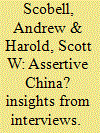

|
|
|
|
|
| Publication |
2013.
|
| Summary/Abstract |
Recent years have witnessed the emergence of a more assertive China. What happened to China's "peaceful rise" and "charm offensive"? What explains the changes in China's foreign policy? According to interviews with Beijing and Shanghai-based analysts, China's assertiveness between 2008 and 2010 can be divided into two waves, each triggered by a different cause. The first wave seems triggered by a sense in Beijing that Washington, DC was more differential to China's interests, and less committed to East Asia. The second wave seems best explained as China's response to what it perceived as a far more assertive and threatening United States. Both waves were amplified by two domestic challenges: Chinese leaders' hypersensitivity to popular nationalism and poor bureaucratic coordination among an expanding number of foreign policy actors.
|
|
|
|
|
|
|
|
|
|
|
|
|
|
|
|
| 2 |
ID:
119258
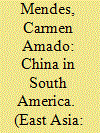

|
|
|
|
|
| Publication |
2013.
|
| Summary/Abstract |
The growing presence of the People's Republic of China (PRC) in South America highlights its domestic priorities. On the economic side, high levels of development, source of political stability and international recognition, exacerbate the need of importing natural resources and exporting manufactured products. Politically, the policy of national reunification, which is also an important provider of stability drawn from nationalism, demand strengthening relations with countries in areas attracted by Taiwan, isolating the island in the international arena. Beijing is actively working to increase its political leverage and shape the agenda of international politics giving South-South cooperation a strategic dimension well beyond mutual development. This fits South American objectives, namely the ones of Brazil, Argentina and Venezuela, that aim at diversifying international partnerships and perceive China as an alternative to the traditional orientation towards Latin America, the US and Europe. Positioning itself as a stakeholder, China creates the basis for an alternative international order using persuasion. The Chinese soft power in South America may be a drop of water in a much broader strategy.
|
|
|
|
|
|
|
|
|
|
|
|
|
|
|
|
| 3 |
ID:
107185
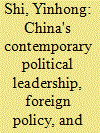

|
|
|
|
|
| Publication |
2011.
|
| Summary/Abstract |
There have been several profound features embedded in the contemporary Chinese political leadership, all having their roots in the Chinese centuries-long traditions or the modern/contemporary creative practice, together with their shaping impacts upon China's foreign policy or remarkable reflections in her external behavior. They are: reforms inherently differentiated; central idea of "maintenance", notion of "biological circle governing universe", paradox in the question of equality, the emphasis on morality, overwhelmingly domestic function of foreign policy, firm belief in the Chineseness per sue and its overwhelming importance, and political prudence in the perennial context of "Strong China, Weak China." China is facing enormous domestic historical challenges and substantial international pressure, while a generally peaceful China can be assured at least from her self-regarding realistic perspective.
|
|
|
|
|
|
|
|
|
|
|
|
|
|
|
|
| 4 |
ID:
189196
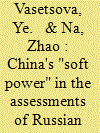

|
|
|
|
|
| Summary/Abstract |
IN THE first quarter of the 21st century, China's influence in the world has risen considerably, drawing the interest of researchers from various countries. Analysts curious about the driving forces of this success agree that "China's peaceful rise" has largely been due to the use of "soft power" tools. The 2022 Winter Olympics is a pertinent example: They offered the world an image of a successful China and a symbolic victory over the COVID-19 pandemic.
|
|
|
|
|
|
|
|
|
|
|
|
|
|
|
|
| 5 |
ID:
107167
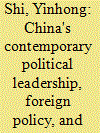

|
|
|
|
|
| Publication |
2011.
|
| Summary/Abstract |
There have been several profound features embedded in the contemporary Chinese political leadership, all having their roots in the Chinese centuries-long traditions or the modern/contemporary creative practice, together with their shaping impacts upon China's foreign policy or remarkable reflections in her external behavior. They are: reforms inherently differentiated; central idea of "maintenance", notion of "biological circle governing universe", paradox in the question of equality, the emphasis on morality, overwhelmingly domestic function of foreign policy, firm belief in the Chineseness per sue and its overwhelming importance, and political prudence in the perennial context of "Strong China, Weak China." China is facing enormous domestic historical challenges and substantial international pressure, while a generally peaceful China can be assured at least from her self-regarding realistic perspective.
|
|
|
|
|
|
|
|
|
|
|
|
|
|
|
|
| 6 |
ID:
139781
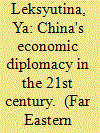

|
|
|
|
|
| Summary/Abstract |
The author takes on China's economic diplomacy, a key area of that country's foreign policy in the 21st century that includes economic rewards and coercion. She addresses, in particular, the measures Beijing is taking to make other countries heavily dependent on China. The author also discusses the significance of aid China offers in an effort to advance its foreign policy goals.
|
|
|
|
|
|
|
|
|
|
|
|
|
|
|
|
| 7 |
ID:
114773
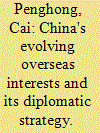

|
|
|
| 8 |
ID:
141373
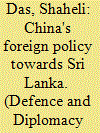

|
|
|
| 9 |
ID:
137183
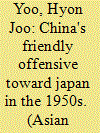

|
|
|
|
|
| Summary/Abstract |
This article explores why the People's Republic of China employed a surprisingly soft and lenient policy toward Japan in the 1950s despite their historical and political animosities. Relying on a relatively new concept in the study of international relations, I argue that China's conciliatory policy toward Japan represented a wedge strategy that was designed to detach Japan from the United States and weaken the US-Japan alliance. The logic of the theory also reveals that China's policy was in line with its “united front” against the United States during the Cold War.
|
|
|
|
|
|
|
|
|
|
|
|
|
|
|
|
| 10 |
ID:
127574


|
|
|
|
|
| Publication |
2012.
|
| Summary/Abstract |
When the fourth generation of leaders came to power in China, the country began drawing up its policy in Central Asia (CA) on the concept of peripheral diplomacy, which since 2005 has been based not on the thesis of "China's peaceful rise," but on the theory of "peaceful development" that came to replace it, as well as on the idea proposed by Hu Jintao of "working together to build a harmonious world." At present, China's relations with the regional states are being established in keeping with the concept of "friendly, peaceful, and prosperous neighbors" (mulin, anlin, fulin) confirmed at the 17th congress of the CPC. As Fudan University Professor Zhao Huasheng, a leading Chinese specialist on CA, emphasized, this concept, which was formulated as early as 2003, reflects the new approaches to relations with neighboring countries.
|
|
|
|
|
|
|
|
|
|
|
|
|
|
|
|
| 11 |
ID:
117783


|
|
|
| 12 |
ID:
098857
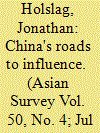

|
|
|
|
|
| Publication |
2010.
|
| Summary/Abstract |
This paper argues that although the People's Republic of China is promoting crossborder networks as a new regional common good, it is driven by both the fear of losing influence to other powers and the desire to create an open economic order in pursuit of Chinese interests. As in most forms of communication, it also appears in this case that the strongest player is best positioned to use these channels to its own advantage.
|
|
|
|
|
|
|
|
|
|
|
|
|
|
|
|
| 13 |
ID:
123575
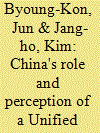

|
|
|
| 14 |
ID:
127799
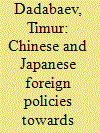

|
|
|
|
|
| Publication |
2014.
|
| Summary/Abstract |
This paper compares and analyses China's and Japan's foreign policies with regard to the newly emerging Central Asian (CA) states based on the role that each country attributes to that region, including political cooperation, economic interaction, security, public perception and mutual relevance. It demonstrates that in some respects, the interests of China and Japan in CA are similar, as exemplified by their focus on mineral resources and political stability. However, these countries differ in their approaches and strategies there: China is inclined to follow pragmatic approaches, whereas Japan's policy is a mixture of idealistic and pragmatic perspectives.
|
|
|
|
|
|
|
|
|
|
|
|
|
|
|
|
| 15 |
ID:
130426
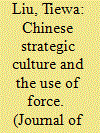

|
|
|
|
|
| Publication |
2014.
|
| Summary/Abstract |
This article reviews and explains Chinese attitudes towards the use of force in international affairs, especially from the perspective of strategic culture. The author traces back the traditional values which originated from ancient Chinese thoughts and also researches Mao Zedong's perception of war, which symbolizes the contemporary Chinese military strategic theory, and Deng Xiaoping and Hu Jintao's discourse on war thereafter, which represents the beliefs of the Chinese government after adopting the opening-up and reform policy. The case studies of the Korean War, the Vietnam War and the two Iraq Wars further explore the principles which dominate the diplomatic decision-making processes. The article concludes that China, in the predictable future, will still firmly adhere to the principles of state sovereignty, non-interference and non-use of force principles, while at the same time China will not hesitate to participate in the multilateral operations which are ratified with UN Security Council authorization and contribute increasingly to improving humanitarian situations due to its moral and political understanding of the use of force in international relations
|
|
|
|
|
|
|
|
|
|
|
|
|
|
|
|
| 16 |
ID:
186877
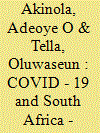

|
|
|
|
|
| Summary/Abstract |
While South Africa–China relations were only formalized in 1998, relations between these states date back to the 1800s. South Africa's quest for sustainable development through partnerships with global powers motivated its close ties with China. The 2015 Cape Town Declaration committed the two countries to improve health facilities and disease control. The coronavirus (COVID-19) pandemic presents an opportunity to rethink this partnership. Drawing on desktop research, this article engages the reality of COVID-19 and explores South Africa–China relations in the context of the pandemic. The emergence of the virus in China, its rapid spread, and the high fatality rate have had devastating repercussions across the world. This article argues that Beijing's response to COVID-19 raises more questions than it answers. The outbreak of the virus in China, its response, and emerging cases of racism and xenophobia against Africans in China also raise concerns about the future of South Africa–China relations.
|
|
|
|
|
|
|
|
|
|
|
|
|
|
|
|
| 17 |
ID:
117027
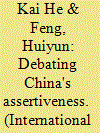

|
|
|
|
|
| Publication |
2012.
|
| Summary/Abstract |
Engaging the recent debate on China's assertive foreign policy, we suggest that it is normal for China - a rising power - to change its policy to a confident or even assertive direction because of its transformed national interests. We argue also that it is better to understand future US-China relations as a bargaining process. Whereas China negotiates for a new status in the system with redefined interests, the United States and other countries need to adjust their old political practices. China's 'core interest' diplomacy launched in 2009 is the first step in revealing 'private information' for peaceful bargaining with the outside world. A status quo foreign policy is not a wise choice for the United States because of the changing power and interest configurations in the international system.
|
|
|
|
|
|
|
|
|
|
|
|
|
|
|
|
| 18 |
ID:
123756


|
|
|
|
|
| Publication |
2013.
|
| Summary/Abstract |
What will China's foreign policy be under Xi Jinping, the new Chinese leader in Beijing? Will Xi follow Hu Jintao-his predecessor-or change the course of China's foreign policy orientation in the next decade? Engaging in the current debates over rising China's foreign policy and its implications for regional security, we suggest 'bringing the leaders back in' for a study of China's foreign policy under Xi. We apply operational code analysis, a political psychology approach, to examine the differences and similarities of Xi and Hu's belief systems. We suggest that Xi shares Hu's philosophical and instrumental beliefs, which implies more continuities than changes in China's foreign policy under Xi. In addition, Hu and Xi share similar cooperative worldviews, but the latter's strategy tends to be more assertive. This suggests that although Xi is a status quo leader, optimistic about the existing international system, he may adopt an assertive foreign policy to achieve his strategic goals if external pressure grows too great. Other states, especially the United States, need to review and revise their foreign policy on China should they have adopted, or intend to adopt, a containment policy towards the PRC, because although a rising China may not be a threat, an angry China indeed will be.
|
|
|
|
|
|
|
|
|
|
|
|
|
|
|
|
| 19 |
ID:
122132


|
|
|
|
|
| Publication |
2013.
|
| Summary/Abstract |
The Report of the 18th CPC National Congress provides a comprehensive and in-depth analysis of the international situation and China's foreign policy. Guided by the decision of the 18th CPC National Congress, China will hold high the banner of peace, development, cooperation and mutual benefit, unswervingly follow the path of peaceful development, promote the concept of mutual benefit in international relations, push for the building of a new type of major-country relations featuring long-term stability and healthy growth, stick to the policy of good-neighborliness and strive to bring more benefits to its neighbors through its own development, remain a reliable friend and sincere partner of other developing countries, take a more active part in international affairs, and play the role of a major responsible country.
|
|
|
|
|
|
|
|
|
|
|
|
|
|
|
|
| 20 |
ID:
145406
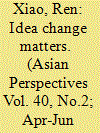

|
|
|
|
|
| Summary/Abstract |
In this article I examine the changes in China's foreign policy thinking and how they have influenced China's international behavior. I reveal how the leadership's beliefs guided and drove the Chinese state's behavior. When leaders believed that the world was in a “war and revolution” age, China was inclined to overlook the actual international order and institutions and backed revolutionary movements or armed struggles in other countries. The cognitive shift to “peace and development” in the 1980s, which was consolidated in the 1990s through two major debates, was fundamental in terms of strategically reshaping China's behavior, turning it from a revolutionary state into a quasi–status quo state. Besides embracing international institutions, China has also joined neighboring countries in creating new regional institutions and norms in East Asia. I argue that ideas, and not only perceptions, guide China's policymaking and international behavior.
|
|
|
|
|
|
|
|
|
|
|
|
|
|
|
|
|
|
|
|
|